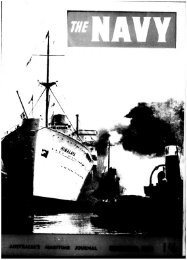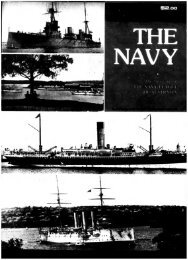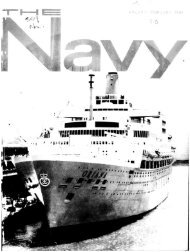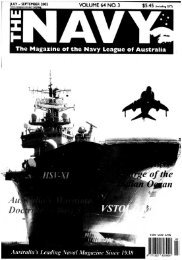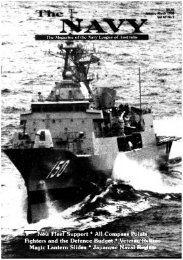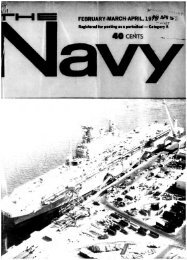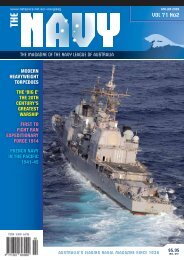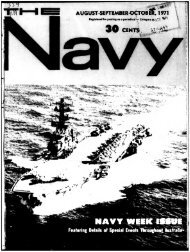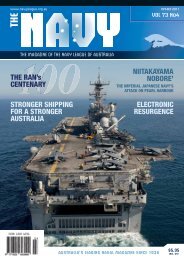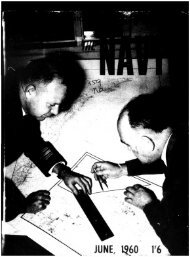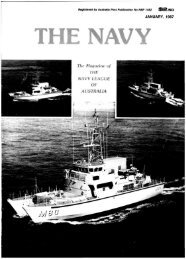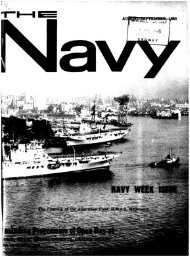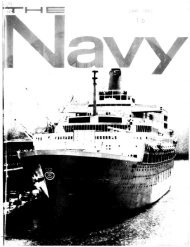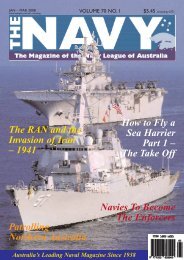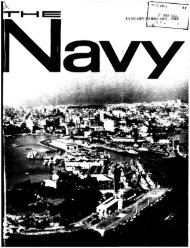Feb-Mar-Apr, May-June-July 1972 - Navy League of Australia
Feb-Mar-Apr, May-June-July 1972 - Navy League of Australia
Feb-Mar-Apr, May-June-July 1972 - Navy League of Australia
Create successful ePaper yourself
Turn your PDF publications into a flip-book with our unique Google optimized e-Paper software.
SPONSORED BY...<br />
Scotts (Echuca) Builders<br />
& Plumbers Supplies<br />
Pty. Ltd.<br />
REG. PLUMBERS VIC. & N.S.W.<br />
For all General Plumbing — Tankmaking, etc.<br />
District Agent for Porta-Gas Oil Heating — Central Heating<br />
256 ANSTRUTHER STREET, ECHUCA, VIC.<br />
Telephone: 837 — A.H.: 1459<br />
This space kindly sponsored by. . .<br />
TUPPERWARE OF<br />
AUSTRALIA PTY. LTD.<br />
10th FLOOR, TRAK CENTRE<br />
445 TOORAK ROAD, TOORAK, VIC.<br />
Telephone: 24 6261<br />
FAITH<br />
WITHOUT<br />
FOUNDATION<br />
The most serious case <strong>of</strong> false<br />
identification occurred <strong>of</strong>f the<br />
Dogger Bank when the heavy units<br />
ploughed through the middle <strong>of</strong> a<br />
large fleet <strong>of</strong> British trawlers, believing<br />
them to be a marauding flotilla<br />
<strong>of</strong> Japanese T.B.D.s. Under the pitiless<br />
glare <strong>of</strong> searchlights the<br />
trawlers were smothered by a hail <strong>of</strong><br />
This incident nearly precipitated<br />
war between England and Russia and<br />
caused the Home Fleet to be brought<br />
to a state <strong>of</strong> readiness. It wasn't<br />
until he arrived at the Spanish port<br />
<strong>of</strong> Vigo that Rozhestvensky was<br />
made aware <strong>of</strong> the uproar his ships<br />
had caused. The Spaniards, not wishing<br />
to <strong>of</strong>fend Britain, gave him a<br />
chilly reception and refuelling the<br />
Squadron from part <strong>of</strong> the fleet <strong>of</strong><br />
hired colliers proceeded only under<br />
adverse diplomatic conditions. It<br />
was from Vigo that Rozhestvensky<br />
(on "-equest from St Petersburg)<br />
sent two conciliatory cables <strong>of</strong><br />
regret which smoothed the ruffled<br />
British feathers.<br />
To act as witnesses at an International<br />
Commission in Paris, set<br />
up to investigate the trawler fiasco.<br />
Rozhestvensky detached three<br />
junior <strong>of</strong>ficers and sent them home.<br />
As their charge, he also took the<br />
opportunity to <strong>of</strong>f-load a pernicious<br />
Admiralty pseudo-savant and<br />
parasite by the name <strong>of</strong> Captain<br />
Nicholas Klado who. with Admiralty<br />
approval, had attached himself to<br />
Rozhestvensky's staff as an<br />
advisor'. The two men loathed each<br />
other, and letting an enemy <strong>of</strong> that<br />
magnitude go free to wreak havoc<br />
against him at the Admiralty was one<br />
<strong>of</strong> Rozhestvensky's great blunders.<br />
That the British Government still<br />
did not quite trust the Russian<br />
Admiral was made plain by the<br />
occasional appearance <strong>of</strong> British<br />
cruisers that were obviously shadowing<br />
the Squadron, which was not to<br />
lose its watchdogs until the arrival<br />
at Tangier on 3 November.<br />
The Sultan made the Russians<br />
welcome and coaling proceeded<br />
without incident. A one-thousand<br />
ton cargo <strong>of</strong> frozen meat arrived on<br />
a transport, as did the snow-white<br />
hull <strong>of</strong> the hospital ship Oryol (a<br />
converted liner with the same name<br />
as the First Division battleship). Her<br />
untouchable staff <strong>of</strong> 100 aristocratic<br />
female nurses were also the<br />
subject <strong>of</strong> much ribald comment<br />
throughout the lower deck.<br />
However, the comment reached<br />
new heights when Rozhestvensky<br />
announced his intention <strong>of</strong> dividing<br />
the Fleet Oslyabaya joined the<br />
badly-directed shellfire which sank<br />
First Division and Admiral von<br />
one <strong>of</strong> the little steamers: decapitated<br />
two men. and damaged several<br />
Felkerzam was directed to proceed<br />
through the Mediterranean Sea to<br />
other vessels with resultant iniuries<br />
Suez and to take with him the old<br />
to personnel.<br />
battleships Sissoi Veliky and<br />
Navarin together with the T.B.D.s<br />
and three light cruisers. He was to<br />
rejoin the remainder <strong>of</strong> the<br />
Squadron at Madagascar.<br />
Rozhestvensky never revealed the<br />
reason for this action and I will avoid<br />
speculation by simply stating that<br />
Felkerzam's little sub-fleet" was last<br />
seen heading East into the Mediterranean<br />
late in the evening <strong>of</strong> 3<br />
November.<br />
The departure <strong>of</strong> the reduced<br />
"Cape Squadron'" from Tangier was<br />
accompanied by the usual chaos <strong>of</strong><br />
the ships attempting to take station<br />
relative to each other; the highlight<br />
<strong>of</strong> which came when a vessel caught<br />
her bower anchor in a submarine<br />
cable. Seamanship went by the<br />
board. The simplest method <strong>of</strong><br />
freeing the anchor was to sever the<br />
cable. Thus it was that Europe heard<br />
nothing <strong>of</strong> North Africa for four days!<br />
The heat <strong>of</strong> Dakar made the<br />
normally back-breaking task <strong>of</strong><br />
coaling an absolute nightmare.<br />
Diplomatic pressure had forced<br />
even France, long an ally <strong>of</strong> Russia,<br />
to be cautious in her dealings with<br />
Rozhestvensky. and Dakar was<br />
French. Not knowing when next he<br />
would have unhindered facilities<br />
(and he did not trust his subordinates<br />
enough to confide this to<br />
them). Rozhestvensky gave orders<br />
to take on double the normal<br />
quantity <strong>of</strong> coal: the bunker surplus<br />
to be stacked in bags wherever,<br />
literally, space could be found. The<br />
heat, extreme humidity, and filthy<br />
coal dust made conditions ripe for<br />
discontent, and it was not surprising<br />
that the first rustlings <strong>of</strong><br />
mutiny weiefelt here.<br />
Normally overloaded warships<br />
were now almost lethally top-heavy<br />
and as sluggish as waterlogged river<br />
scows: the lower gunports became<br />
unworkable and the protective<br />
armour-belts made useless by submergence.<br />
Nevertheless, the Cape<br />
Squadron staggered on at an<br />
average 8Vi knots to Gaboon and<br />
then Libreville. A brief coaling halt<br />
at the Portuguese colony at Great<br />
Fish Bay (December 6) was made uncomfortable<br />
by Portuguese<br />
references to England, her greatest<br />
ally, who would like (if you pL-ase)<br />
the Russian <strong>Navy</strong> to move on poste<br />
haste.<br />
The German South-West African<br />
port <strong>of</strong> Agra Pequena gave the<br />
squaoron a much-needed welcome<br />
on 11 December. This was the last<br />
opportunity to take on coal before<br />
making the long journey around the<br />
Cape <strong>of</strong> Good Hope to Madagascar,<br />
and the unsheltered harbour<br />
enabled a full South Atlantic gale to<br />
vent its fury on the coaling efforts<br />
which slowed to a halt in the face <strong>of</strong><br />
huge seas. Coaling resumed on 15<br />
December, and the Squadron finally<br />
left African shores on the 17th.<br />
Rozhestvensky expected to find a<br />
cruiser (from Felkerzam's detached<br />
Squadron) waiting for him upon his<br />
arrival on New Years Day 1905 at the<br />
Madagascan port <strong>of</strong> Sainte <strong>Mar</strong>ie to<br />
convey the information that<br />
Felkerzam was anchored and awaiting<br />
orders further up the coast at<br />
Diego Suarez. When Rozhestvensky<br />
found, to his fury, that one <strong>of</strong> Felkerzam's<br />
ships was not there he sent the<br />
tug Rousse to find him. Meanwhile,<br />
a collier arrived from Felkerzam with<br />
the news that he was. on Admiralty<br />
orders at Nossi-Be overhauling his<br />
engines. Hard on her heels came the<br />
Rousse whose captain returned with<br />
the diastrous news from Felkerzam<br />
that (a) Port Arthur had fallen to the<br />
Japanese, (b) the remnants <strong>of</strong> the<br />
Pacific Squadron had been either<br />
captured or destroyed by siege<br />
artillery, (c) therefore the Second<br />
Pacific Squadron was no longer a<br />
relief force and (d) Russia had lost<br />
her only adequate base in the Pacific<br />
area<br />
It was the fall <strong>of</strong> Port Arthur that<br />
caused their old French allies to yield<br />
to British and Japanese pressure and<br />
deny them the use <strong>of</strong> Diego Suarez.<br />
which explained further why<br />
Felkerzam was at Nossi-Be Nor was<br />
that the end <strong>of</strong> it.<br />
The Hamburg-Amerika Line,<br />
whose colliers had fulfilled their<br />
Page Twenty-six THE NAVY <strong>May</strong>/<strong>June</strong>/<strong>July</strong><br />
<strong>May</strong>/<strong>June</strong>/<strong>July</strong><br />
THE NAVY<br />
Page Twenty-seven



